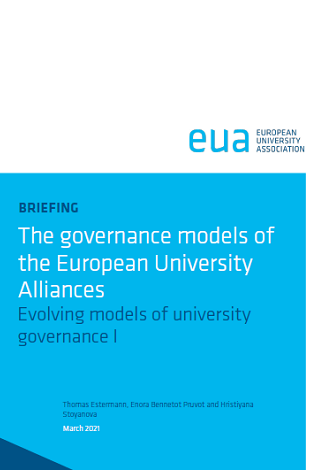Autonomy & Governance
Universities are important in catering to the needs of today’s rising knowledge societies. Beyond the traditional work of teaching and producing research and innovation, higher education institutions are tasked with various roles and face new challenges. These include evolving student populations, a changing labour market resulting in the need for continued professional development, and challenges to university autonomy in how to address such trends.
EUA is dedicated to supporting universities in their efforts to make successful decisions on the issues affecting them, especially in areas such as management, funding, human resources and academic profile, both in the EU and in its Neighbourhood. Within the last decade, several university governance reforms have taken place, both within national systems and inside the institutions themselves, regarding the relation between universities and public authorities and internal university organisation.
While acknowledging that there are different models for these reforms, the dialogue developed through EUA’s comparative approach outlines the basic principles and conditions that universities need to have in order to best fulfil their missions and tasks.
Promoting institutional autonomy as a core principle continues to be highly-relevant and important, as it supports university values. In a tense political environment, attempts to limit or undermine autonomy can take many forms. Through its work and tools, EUA supports a structured, fact-based dialogue on governance, autonomy and efficiency, in partnership with the sector and public authorities.
-
Leadership & Governance
University executives are political and academic leaders who manage a complex community and are responsible for fostering the development of the institution and its financial sustainability. The Covid-19 crisis amplified the need for university leaders and managers to inspire a vision and the dynamics of change, while creating consensus and gaining the endorsement of all constituencies.
This has been particularly important in countries where autonomy reforms have concentrated powers in central university leadership. The level of autonomy that universities in Europe have today in designing their governance models along the lines of their missions and societal expectations varies greatly. Universities require:
- at the system level, a productive relationship with public authorities and an enabling regulatory framework;
- at the institutional level, adequate internal governance models, an appropriate balance between the inclusion of diverse university communities and efficient decision-making.
-
Autonomy Scorecard
The EUA Autonomy Scorecard features extensive information on the current state of university autonomy and governance reforms in Europe. By gathering, comparing and weighing data from higher education institutions across the continent, EUA provides in-depth benchmarking of national policies with regard to university autonomy and the exchange of good practices. Since its creation, the Scorecard has become a reference point in discussions about university autonomy in Europe and beyond.
The Autonomy Scorecard is made up of a comparative summary report, an online tool & and individual country profiles.
The online tool lets you compare university autonomy in 29 European higher education systems. It focuses on four autonomy areas and ranks countries according to the level of autonomy they have in each area.
-
Efficiency
EUA has worked on the topic of efficiency through the USTREAM project. By examining the measures that are in place at universities across Europe to enhance efficiency in various settings and by analysing policies at the system level that support universities in their efforts to operate more efficiently, EUA was able to identify good practice examples and develop recommendations for further development. More broadly, EUA’s work in this area addresses efficiency, effectiveness and value for money at European universities in a comparative way. The Association takes a novel approach to the topic by tailoring it to the specificities of the higher education sector and breaking it down into three thematic dimensions: efficiency in professional, operational and support services; efficiency in academic matters; efficiency through strategic governance.
The USTREAM partners have developed an “efficiency self-evaluation tool” (The University Efficiency Hub), which supports higher education institutions in the assessment of their efficiency programmes and activities. The tool allows university practitioners and policy makers across Europe to share knowledge and hands-on experience in efficiency, effectiveness and value for money in the field of higher education. It provides information on national frameworks as well as institutional good practices and a self-evaluation tool for universities to move forward in their strategy.
-
University Mergers
Mergers and concentration processes are becoming increasingly frequent as the higher education sector is faced with the double impetus of more competition and stronger cooperation, especially in a period following the global financial crisis. More recently, in systems that have been hit heavily by the Covid-19 pandemic, discussions have emerged about whether mergers and restructuring can constitute an adequate policy response to address the financial difficulties. Collaboration frameworks cover a wide array of activities and can become quite complex. In order to succeed, merger processes need the right conditions.
EUA has analysed this in the report “Designing strategies for efficient funding of universities in Europe” and has developed a tool to map institutional mergers in the university sector across Europe.
Positions
-
View more
15 Oct 2020
The new European Research Area: building capacity through dialogue
EU Commissioner Mariya Gabriel, during the European Research and Innovation Days in September 2020, stated that excellence and inclusiveness are two sides of the same coin in the new European Research Area (ERA). EUA welcomes the European Commission’s Communication “A new ERA for Research and Innovation” released on 30 September 2020 as a starting point to making this ambition a reality.
Resources
-

University Autonomy in Europe IV: Country Profiles (II)
Report
18 Dec 2023EUA's Autonomy Scorecard country profiles delve into in-depth system analyses, offering insights...
read more -
University Autonomy in Europe IV: Country Profiles (I)
Report
12 Oct 2023The 2023 edition of the European University Association’s Autonomy Scorecard, the most...
read more -

Innovative Leadership and Change Management in Higher Education
Report
31 Aug 2023This report presents the key findings and recommendations of the NEWLEAD project’s efforts...
read more -
HE Transformation Leadership – an analysis of emergent and high potential...
Report
30 Aug 2023This report is another NEWLEAD project output exploring the transformation agenda in the higher...
read more -
CRASP practices on emergency management | Coordinators network for combating...
Video
30 Aug 2023 view more -
CRASP practices on emergency management | Support for Ukraine
Video
30 Aug 2023 view more -
NEWLEAD Workbook 4: HE Transformation Leadership – an analysis of emergent and...
External resource
30 Aug 2023 view more -
NEWLEAD digital repository
External resource
25 Aug 2023 view more -
NEWLEAD playlist on YouTube
Video
24 Aug 2023 view more -

Implementing leadership development programmes for university leaders: an...
Report
5 Jun 2023This NEWLEAD guide offers recommendations and reflections for university leaders, university...
read more -
EUA supports Swedish universities’ call to protect institutional autonomy
News
23 May 2023The European University Association condemns the recent decision by the Swedish government to shorten the mandate of external members of university boards from three years to 17 months. The Swedish government’s decision, predicated on the rationale that institutions need expertise to address...
view more -
NEWLEAD project new publication Leading change in diversity and cross-cutting...
Partners news
15 May 2023The NEWLEAD project consortium published a new workbook focused on Leading change in diversity and cross-cutting challenges. Developed by Ramon Llull University and Crue Spanish Universities, this is the first of a series of hands-on reports collecting good practices that can serve as a guide...
view more -
NEWLEAD Workbook 1: Leading change in diversity and cross-cutting challenges
External resource
15 May 2023 view more -

University Autonomy in Europe IV: The Scorecard 2023
Report
7 Mar 2023The Scorecard 2023 provides a full comparative analysis of the state of play of university...
read more -

Applying the Autonomy Scorecard in Europe: Insights from EUA members
Video
10 Feb 2023 view more -

Applying the Autonomy Scorecard in Europe: Insights from Latvia
Video
10 Feb 2023 view more -

Applying the Autonomy Scorecard in Europe: Insights from the Netherlands
Video
10 Feb 2023 view more -

Applying the Autonomy Scorecard in Europe: Insights from Sweden
Video
10 Feb 2023 view more -

Applying the Autonomy Scorecard in Europe: Insights from Spain
Video
10 Feb 2023 view more -

Applying the Autonomy Scorecard in Europe: Insights from Ireland
Video
10 Feb 2023 view more -
EUA Board urges Hungarian government to address autonomy concerns to ensure...
News
1 Feb 2023In accordance with a December 2022 Council of the European Union decision to protect “the Union budget against breaches of the principles of the rule of law in Hungary”, the European Commission has ceased to enter into legal commitments with public interest trusts under Hungarian law and the...
view more -

The European Universities Initiative and system level reforms
Briefing
19 Oct 2022As the European Universities Initiative moves into a new phase, EUA has taken stock of its impact...
read more -

Leading through disruptive transformations in higher education
Report
13 Oct 2022Today, more than ever before, universities are expected to fulfil multiple and increasingly...
read more -
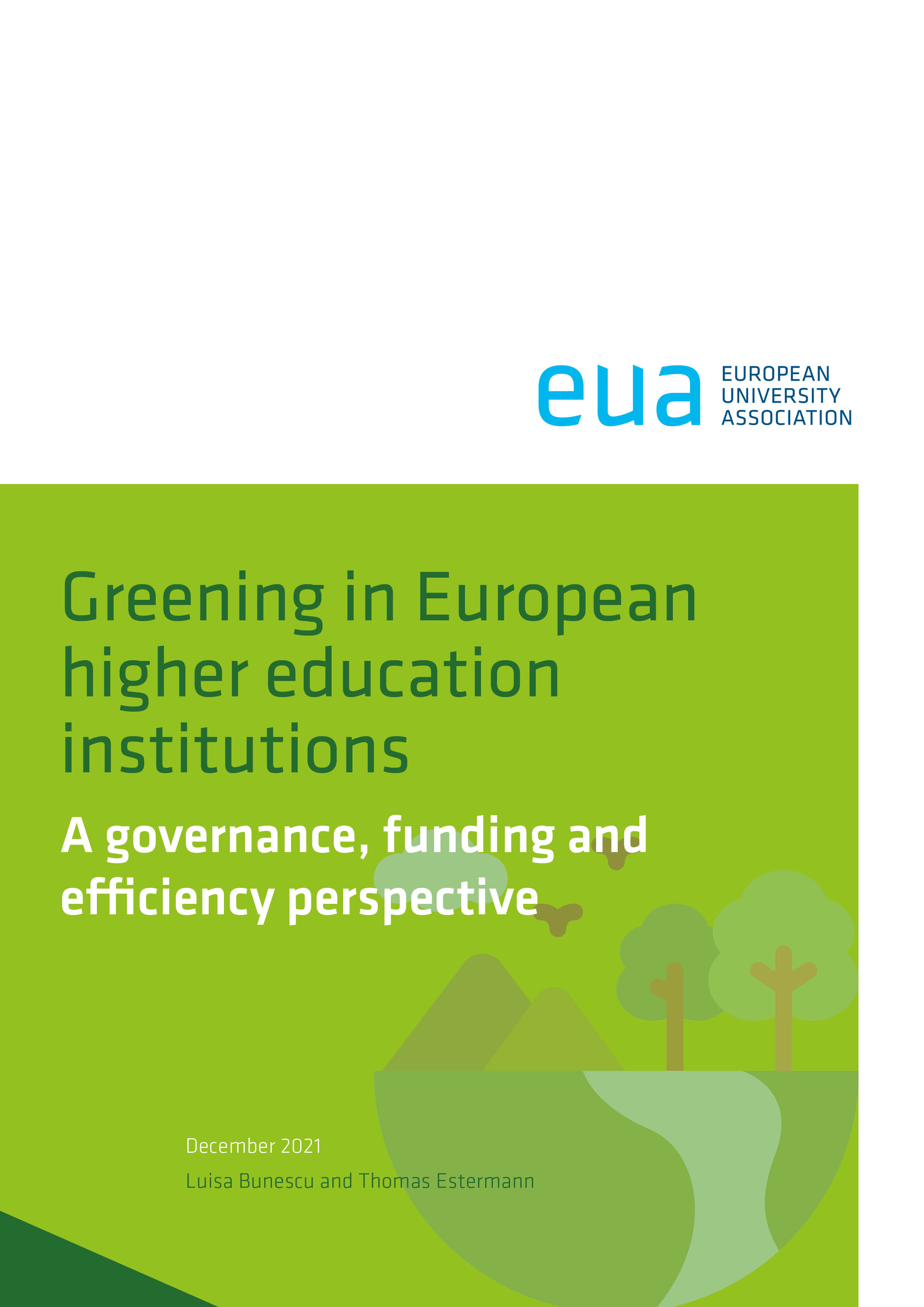
Greening: a governance, funding and efficiency perspective
Policy input
15 Dec 2021Given their education, research and societal missions, universities are important actors in the...
read more -

Institutional transformation and leadership development at universities. A...
Report
21 Oct 2021Given the rapid and intense change taking place in our societies and, invariably, at our...
read more -
Council of Europe call: Best Practice Programme in Promoting Academic Integrity
Partners news
7 Jul 2021The Council of Europe Education Department has opened a call for best practices in promoting academic integrity in higher education institutions in Europe, under its new Best Practice Programme. The deadline is 20 August 2021. The call focuses on solutions found to promote academic integrity...
view more -
Belarus: EUA, ESU and SAR call on Europe to take action against...
News
28 May 2021The European University Association (EUA), the European Students’ Union (ESU) and Scholars at Risk (SAR) join together to condemn the criminalisation of students and academics in Belarus. They call on the Belarusian authorities to protect and promote academic freedom and related fundamental rights...
view more -
SAR – Ireland and ALLEA online conference “Academic freedom and intellectual...
Partners news
21 May 2021Scholars at Risk – Ireland and ALLEA, the European Federation of Academies of Sciences and Humanities, organise the online conference “Academic freedom and intellectual dissent” on 8 June, from 15.00 to 20.00 CEST. This conference will focus on the importance of intellectual dissent and...
view more -
DAAD scholarship “Hilde Domin Programme” for students and doctoral candidates...
Partners news
16 Apr 2021The German Academic Exchange Service (DAAD) offers the scholarship programme “Hilde Domin Programme” to support students and doctoral candidates from across the globe who are at risk of being formally or de facto denied educational or other rights in their country of origin. The application portal...
view more -
SAR webinar “Free Universities: Putting the Academic Freedom Index Into Action...
Partners news
25 Mar 2021Scholars At Risk (SAR) organises the webinar “Free Universities: Putting the Academic Freedom Index Into Action Through the UN Human Rights Systems” on 15 April from 15.00 to 16.00 CEST. The webinar will present the Academic Freedom Index (AFi), which draws on contributions by some 2,000...
view more -
Free University of Brussels (ULB) Solidarity Fund for researchers at risk
Partners news
23 Mar 2021EUA member Free University of Brussels (ULB) has created a Solidarity Fund in order to provide support for researchers who no longer have the freedom to pursue their research in their home country, where they are threatened due to the content of their scientific work or to the opinions they have...
view more -
Philipp Schwartz and Inspireurope Stakeholder Forum 2021, 26 - 27 April
Partners news
19 Mar 2021The Alexander von Humboldt Foundation’s Philipp Schwartz Initiative and the Inspireurope project organise the online Philipp Schwartz and Inspireurope Stakeholder Forum 2021 on 26 and 27 April. The event will be in English. Participants will include at-risk scholars, academic mentors,...
view more -
The governance models of the European University Alliances
Briefing
18 Mar 2021This is the first briefing in a new EUA series focused on evolving university governance. The...
read more -
EUA supports the Conférence des Présidents d’Universités (France) in its call...
News
25 Feb 2021On 14 February, Frédérique Vidal, French Minister for Higher Education, Research and Innovation, announced plans to order the French research agency (CNRS) to conduct an enquiry into French university research focused on colonialism and race. The aim, according to Vidal, is to identify those...
view more -
Inspireurope webinar “Psychosocial support for researchers at risk”, 10 March
Partners news
17 Feb 2021Inspireurope organises the webinar “Psychosocial support for researchers at risk” on 10 March from 10:00 to 11:00 CET. The webinar will be followed by a 55-minutes follow-up meeting. Both are free of charge. The focus of this webinar will be on how organisations who are hosting or employing...
view more -
Turkey and university autonomy: criticism rises as government appoints new...
News
22 Jan 2021In Turkey, the practice of appointments of university rectors by the President of the Republic is generating a new wave of criticism. The recent nomination of a new rector at Bogaziçi University in Istanbul has led opposition parties, civil rights organisations and parts of the higher education...
view more -
Inspireurope webinar on Hosting Researchers at Risk, 9 December
Partners news
30 Nov 2020Inspireurope organises the webinar ‘Hosting Researchers at Risk: How employers and hosts can help researchers make the most of their stay’ on 9 December from 10:00 to 11:00 CET. The webinar is free of charge. This webinar is for representatives of higher education institutions and other...
view more -
Academic freedom and institutional autonomy: developments in Europe and beyond
News
17 Nov 2020Recent months have seen important events regarding academic freedom, both in Europe and globally. There have been violations of democratic and human rights in Belarus, including threats against students and staff of universities – which were widely condemned. Last month, the Court of Justice...
view more -
Belarus: Statement of the European University Association (EUA) and the...
News
2 Nov 2020The European University Association (EUA) and the European Students’ Union (ESU) are concerned by the grave violations of democratic and human rights that continue to be witnessed in Belarus. The two organisations strongly condemn recent threats of expulsion, dismissal or conscription into the...
view more -
Hungary: EU court rules education amendments unlawful
News
12 Oct 2020On 6 October 2020, the Court of Justice of the European Union (ECJ) ruled that the Hungarian government violated EU law in 2017 when it changed its education legislation. The amendments made headlines as they ultimately led the Central European University (CEU), an EUA member, to move most of its...
view more -
Romanian president moves to reject ban on gender studies
News
13 Jul 2020On 10 July, Romanian President Klaus Iohannis submitted an appeal to the country’s Constitutional Court regarding an amendment passed by the Parliament that would prohibit gender studies in all education institutions. The Romanian Parliament approved the amendment to the education law on 16 June....
view more -
EUA Annual Conference webinar #2: Promoting universities societal engagement
Video
30 Apr 2020 view more -
Graduate student arrested in Egypt: EUA calls for immediate release
News
14 Feb 2020The University of Bologna, an EUA member, has launched a powerful appeal to the European Union and its member states to take prompt action in the case of Patrick George Zaky, a graduate student at the University of Bologna who was arrested at the Cairo airport on 7 February. Zaky had travelled...
view more -
Academic freedom in Turkey: EUA calls for the liberation of former Rector...
News
26 Nov 2019EUA is gravely concerned by reports of academics still being held in prison for having signed the Academics for Peace petition “We Will not be a Party to this Crime”, which addressed the situation in south eastern Turkey. On 26 July 2019, the General Assembly of the Turkish Constitutional Court...
view more -
Obstacles to Excellence: new report from Scholars at Risk maps threats to...
Partners news
30 Sep 2019EUA partner Scholars at Risk released the report Obstacles to Excellence, mapping threats to academic freedom that jeopardise China’s higher education ambitions. As noted in the report, a small but growing number of international universities have responded to academic freedom concerns by...
view more -
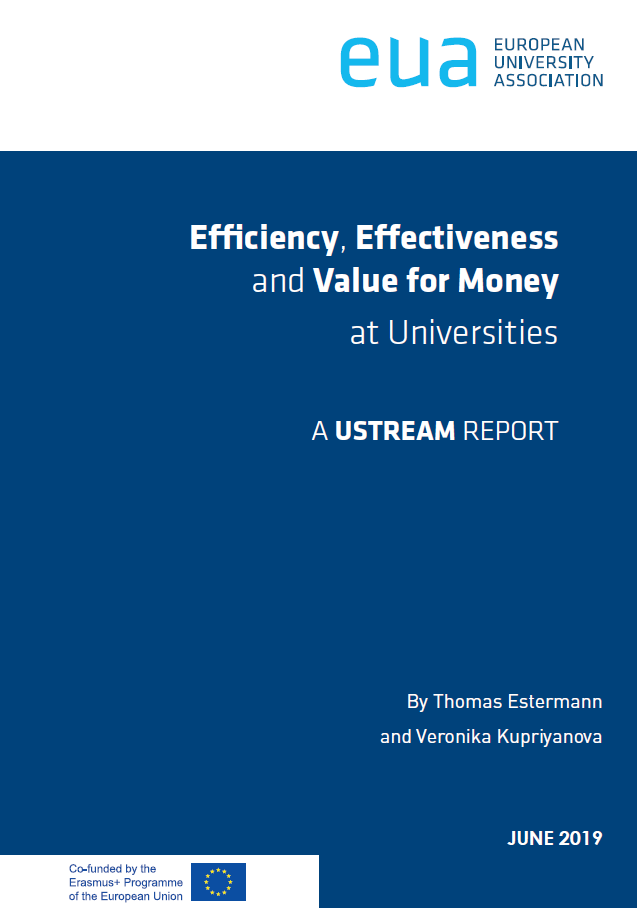
Efficiency, Effectiveness and Value for Money at Universities
Report
18 Jun 2019Over the last decade, policy makers and universities in Europe have been paying greater attention...
read more -

Is the restructuring of the European higher education sector coming to an end?
News
16 May 2019Data collected by EUA shows that a peak in merger and clustering activities involving universities...
view more -

University Mergers in Europe
Briefing
8 May 2019University mergers are a widely spread phenomenon in Europe. This briefing analyses the features...
read more -
EUA outlines path towards greater autonomy for Kazakh universities
News
17 Jan 2019EUA mobilised its expertise in university governance and autonomy to assist Kazakh universities in assessing their current regulatory framework and in pointing to opportunities to enhance autonomy in the sector. In the framework of the EU-supported project “Transition to university...
view more -
IEP publishes the Montenegro system review report
News
10 Jan 2019EUA’s Institutional Evaluation Programme (IEP) evaluated nine Montenegrin higher education institutions in 2018. Based on the individual evaluation reports, IEP published in December a system review report, which examines common issues and challenges amongst the nine institutions and...
view more -
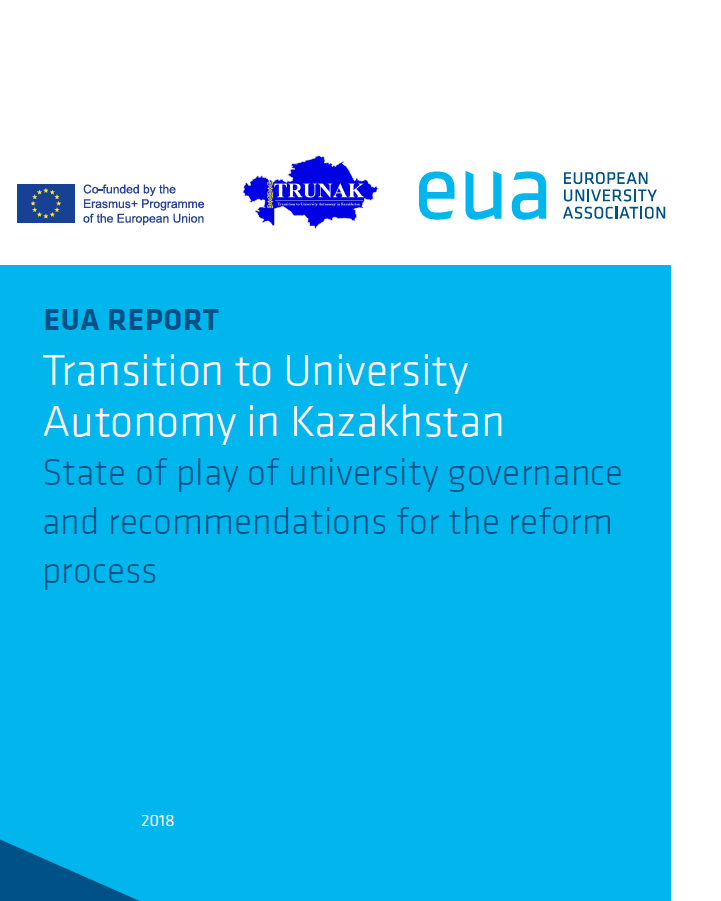
Transition to University Autonomy in Kazakhstan
Report
9 Jan 2019This report is a milestone of the EU-supported project “Transition to University Autonomy in...
read more -
A strategic approach to change for university leaders
News
13 Dec 2018During the course of this year EUA has been focusing on the capacity of university leaders to initiate and carry out strategic transformation programmes in a series of activities. Indeed, many universities across Europe are developing such programmes, that either seek a step change in...
view more -

Efficiency, Leadership and Governance: Closing the gap between strategy and...
Report
5 Dec 2018Many European universities are initiating strategic transformation programmes that either seek a...
read more -
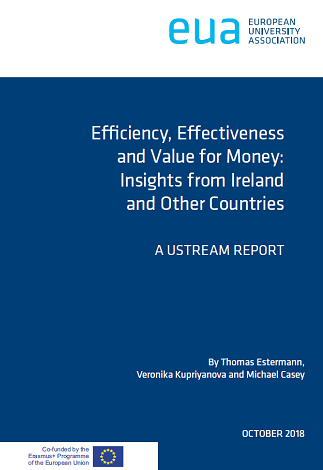
Efficiency, Effectiveness and Value for Money: Insights from Ireland and Other...
Report
9 Oct 2018This report provides examples of government-led initiatives implemented in response to national...
read more -

University Governance: Autonomy, Structures and Inclusiveness
External resource
25 Sep 2018 view more -

Efficiency of Universities: Drivers, Enablers and Limitations
External resource
25 Sep 2018 view more -
EU values: European Parliament calls Hungarian government to order
News
12 Sep 2018On 12 September 2018, the European Parliament invoked Article 7, triggering a procedure to determine if Viktor Orbán’s government in Hungary has systematically breached the EU’s core values. Notably, this is only the second time the Article has been invoked in EU history, and...
view more -
EUA condemns Hungarian government plan to ban gender studies
News
24 Aug 2018The Hungarian government has announced plans to eliminate gender studies from the country’s list of accredited university study programmes. The Board of the European University Association (EUA) calls on the Hungarian Ministry for Human Resources to cancel its plans as gender studies are a...
view more -

USTREAM fuels national discussions on university efficiency, autonomy and...
News
17 May 2018The first USTREAM national policy dialogue event took place on 8 May in Riga, Latvia. Organised...
view more -

Efficiency, Effectiveness and Value for Money: Insights from the UK and other...
Report
26 Apr 2018This report provides a summary of the input, discussions and findings from the first USTREAM peer...
read more -
Hungary: EUA denounces attacks on academic freedom
News
17 Apr 2018The European University Association (EUA) strongly condemns the recent intimidation of academics in the Hungarian media. The pro-government magazine Figyelo listed the names of more than 200 people, calling them “mercenaries” of George Soros, a Hungarian-American...
view more -

EUA training for partners engaged in fostering university autonomy in Kazakhstan
News
22 Mar 2018On 19-20 March EUA held a two-day training seminar for partners of the TRUNAK project, focused on...
view more -
EUA to support Kazakh universities towards autonomy
News
18 Jan 2018The TRUNAK project officially started at the end of 2017 with a kick-off meeting in Karaganda, Kazakhstan. The project, supported by the European Union under Erasmus+, seeks to enhance university autonomy in Kazakhstan. The project runs until October 2020. It is coordinated by...
view more -
EUA contributes to discussion on “Academic Freedom and Political Repression in...
News
23 Nov 2017On 6-7 November, EUA participated in an event on 'Academic Freedom and Political Oppression in the University Sector', which was co-organised by the Global Public Policy Institute (GPPi), a think tank based in Berlin, and Scholars at Risk, an EUA partner organisation. The aim...
view more -
University Autonomy in Europe III: The Scorecard 2017
Report
17 May 2017The Scorecard 2017 provides a full comparative analysis of the state of play of university autonomy in 29 higher education systems in Europe. The report complements the presentation of the main outcomes which were revealed at EUA’s annual conference “Autonomy and freedom: The future...
read more -
Current situation in the Turkish Higher Education sector
News
15 May 2017EUA has expressed in several occasions its concerns regarding the measures taken in Turkey since the attempted coup in July 2016 and keeps monitoring the evolution of the situation for the higher education sector. As of beginning of May 2017, 3900 public employees have been arrested, and even...
view more -
University Autonomy in Europe III: Country Profiles
Report
16 Apr 2017The EUA Autonomy Scorecard offers a methodology to collect, compare and weight data on university autonomy. A core set of autonomy indicators was developed to offer an institutional perspective on institutional freedom. The Scorecard is based on more than 30 different core indicators in four key...
read more -

EUA launches European-wide debate on university autonomy
News
7 Apr 2017This week, EUA renewed a crucial and timely European-wide dialogue on the importance of university...
view more -
European universities call on Hungarian president to block legislation...
News
6 Apr 2017EUA members – gathered at the University of Bergen on the occasion of the General Assembly and Annual Conference on “Autonomy and Freedom: the Future Sustainability of Universities” – express their deep concern and shock at the adoption on 4 April 2017 of legislation...
view more -
EUA deeply concerned about passage of bill targeting Central European University
News
4 Apr 2017EUA is extremely shocked and deeply concerned by the decision taken on 4 April 2017 by the Hungarian Parliament to adopt the recently proposed amendments to the Hungarian Education Law, targeting the Central European University. The bill was passed apparently without taking into...
view more -
EUA calls on governments to refrain from interference in university autonomy
News
3 Apr 2017This week EUA relaunches a crucial and timely European-wide dialogue on university autonomy. On the eve of its Annual Conference 2017, on this very topic, EUA would like to underline the importance of universities as independent and open communities of scholars and to express its concern about the...
view more -
University autonomy in Turkey: First impact of new decrees
News
15 Nov 2016Following the recent news of further infringements on university autonomy and academic freedom reflected in two decrees (675 and 676) published in the Turkish Official Journal on 29 October 2016, the concerns of the EUA have been confirmed with the first impact of the new decrees. They...
view more -

EUA meets with Turkish Higher Education Council
News
9 Sep 2016EUA met with the Turkish Higher Education Council (YÖK) to discuss developments in the Turkish...
view more -
EUA Statement condemning the forced resignation of 1577 university deans
News
19 Jul 2016Following Friday's coup attempt in Turkey the education sector, including the higher education sector, has been targeted, as have many other public sectors. 15,200 education staff have been suspended while Turkey's Hurriyet reports that the Higher Education Council (YÖK) has ordered the...
view more -

Protect Universities from Attack: Pakistan
News
21 Jan 2016The European University Association (EUA) has learned with deep regret about the attack on Bacha...
view more
Expert voices
-
European Universities Initiative demands system-level reforms [Op-ed]
27 Oct 2022If we want universities to make a leap in transnational cooperation, policymakers must take their...
read more -
More than just a matter of style: female leadership in higher education
19 Sep 2022The growing participation of women in higher education is not yet reflected in university...
read more -
Hope-based leadership: a new vision for higher education institutions
12 May 2022Leaders must respond to the unprecedented challenges facing the higher education system. In these...
read more -
The future of Europe’s universities: opportunities and limits of alliances as testbeds
10 Nov 2021All universities need more autonomy to be innovative, not only those engaged in the European...
read more -
The Academic Freedom Index: a powerful instrument for policy and practice
21 Apr 2021The Academic Freedom Index provides a robust assessment of academic freedom levels worldwide that...
read more -
EUA global collaboration: past, present and future
19 Apr 2021On the occasion of EUA’s 20th anniversary, President Michael Murphy and long-time senior expert...
read more -
The future of the European Universities Initiative: Keeping a balanced approach is crucial
30 Mar 2021As the mid-term evaluation of the first European University Alliances comes up, stakeholders must...
read more -
The emerging governance of the European University Alliances: future-proof complexity?
23 Mar 2021As the European University Initiative nears its mid-term review, it is time to think seriously...
read more -
Between fear and hope – academic freedom and university autonomy in Europe today
23 Mar 2021While the fundamental principles of academic freedom and institutional autonomy have not changed...
read more -
University reforms: Looking back, looking forward
22 Mar 2021On the occasion of the 20th anniversary of the European University Association, Andrée Sursock...
read more -
Behind the wheel: steering universities through transformation
18 Jan 2021In Europe, there is little provision of leadership development schemes in higher education. Given...
read more -
All hands on deck: delivering academic freedom for Europe
14 Dec 2020The important upsurge in statements of support for academic freedom at the intergovernmental level...
read more -
Universities beyond the coronavirus crisis – what awaits?
7 May 2020EUA President Michael Murphy assesses the challenges and opportunities brought by the coronavirus...
read more -
Why we continue to discuss university autonomy and academic freedom
16 Oct 2019University autonomy and academic freedom should be more than topics of proclamation and...
read more -
A reflection on leadership in times of transformation
9 May 2019Universities are changing. Strategy expert Claudia Nuss reflects on what it takes to successfully...
read more -
Hungary’s government needs to change its tune
7 Sep 2018Academic freedom is the latest of the many victims on Hungary’s path towards an illiberal state,...
read more -
State control over academic freedom in Hungary threatens all universities
6 Sep 2018The Hungarian government’s clampdown on gender studies and research into migration sets a...
read more -
Why university autonomy matters more than ever
7 Apr 2017The implications of the political, economic and societal landscape in Europe are becoming ever...
read more
Projects
-
STAND
Strengthening university autonomy and increasing accountability and transparency of Western Balkan universities The STAND project aims to improve the processes and mechanisms of university autonomy by...
-
NEWLEAD
Innovative Leadership and Change Management in Higher Education Today, higher education institutions are tasked with multiple and challenging roles. They...
-
TRUNAK
Transition to University Autonomy in Kazakhstan The TRUNAK project seeks to enhance university autonomy in Kazakhstan. It seeks to develop both...
-
USTREAM
Universities for Strategic, Efficient and Autonomous Management USTREAM sought to examine the measures that are in place in universities across Europe to enhance...
-
ATHENA
Fostering Sustainable and Autonomous Higher Education Systems in the Eastern Neighbouring Area The ATHENA project contributed to the development, reform and modernisation of higher education...
Events
-
As part of the Erasmus+ supported NEWLEAD project on innovative leadership and change management, the European University Association is partnering with...
Read more -
The European University Association (EUA), Universities UK (UUK) and the University of Leicester organised a workshop to debate the issue of University...
Read more -
© Vrije Universiteit Brussel
The final USTREAM peer learning seminar, co-organised by EUA and HUMANE – Heads of University Management and Administration Network in Europe,...
Read more -
The second peer learning seminar addressed national and institutional approaches to delivering efficiency. The focus was to provide case studies on key...
Read more -
This peer learning seminar explored the existing policy frameworks for efficiency and effectiveness in higher education and the ways in which institutions...
Read more



